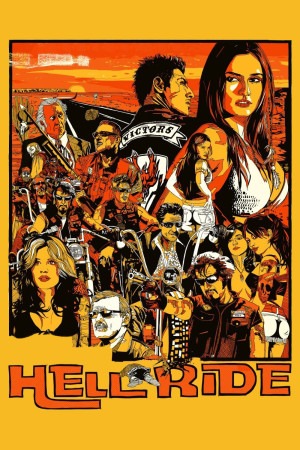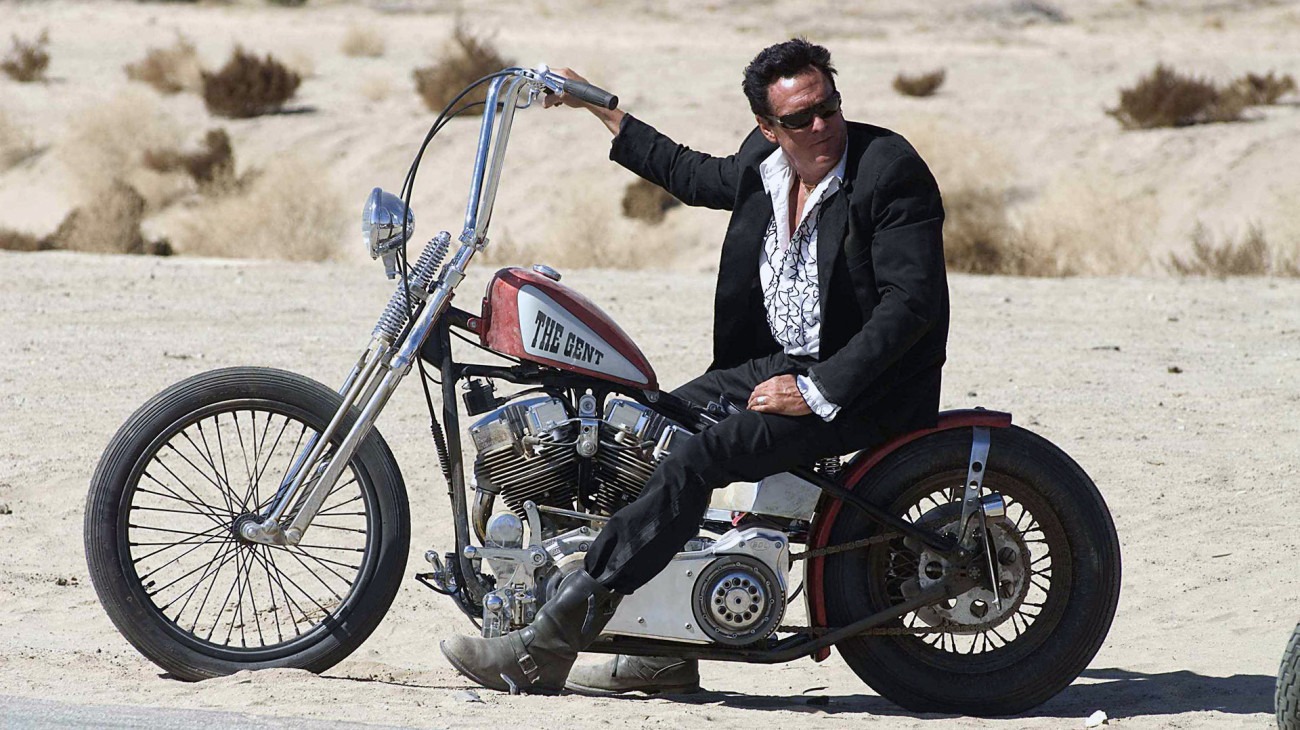
I don't want a pickle
The words "Quentin Tarantino Presents" can only mean one of two things: that the film in question is a drop-dead gorgeous Asian movie that should have been released years earlier, if only Harvey Weinstein weren't such a jackass; or it is a lousy neo-exploitation film. Larry Bishop's Hell Ride, as you can probably guess, is not an Asian movie.
Instead, it's the latest in the evergreen subgenre of Tarantino Rip-Offs, though unlike the 300 or 400 such movies made in the 1990s and early '00s, it isn't Reservoir Dogs and Pulp Fiction that Bishop sets his sights on, but Kill Bill and Grindhouse. For Hell Ride is a deliberate throughback to the sex and blood fueled biker pictures of the '60s and '70s, some of which just so happened to star a much-younger Bishop, like The Savage Seven and Angel Unchained. I haven't seen any of the young actor's vehicles, but I have seen some of their stable mates, and I can't help but feel that Hell Ride misses the mark by a rather wide margin.
The convoluted plot concerns the aging members of the Victors bike gang, led by 53-year-old Pistolero (Bishop himself), in their fight against the Six-Six-Six gang, 32 years after a massacre that ended in the death of Pistol's lover Cherokee Kisum (Julia Jones) and the disapperance of her son. Now the Sixers are back, led by the violent, inexplicably British Billy Wings (Vinnie Jones), and Pistolero, The Gent (Michael Madsen) and new recruit Comanche (Eric Balfour, in a role that was written for Tarantino, of all fucking people) fight to root out the corruption within their gang while simultaneously stopping the Sixers.
Okay, so that's the story, but what the film is about, is scene after scene of Pistolero making out with naked women. Probably not so often as all that, but for more often than is in the remotest good taste. I mean, God bless him for enjoying naked women, but Bishop either doesn't realise or doesn't care that casting himself as a lead character whose primary actions throughout the movie are riding a bike and having sex pushes into creepy territory where it really does read like he's not getting laid, and he structured a whole film around getting himself laid constantly by starlets. Sure, we all like a bit of the old exploitation now and then, but Hell Ride crosses a previously inviolate line separating good-natured T&A from latter-day Woody Allen movies.
When Bishop isn't licking actresses' nipples, he, Madsen, Balfour, and the rest of the cast including a very game Dennis Hopper (the film, happily, does not try to make a big deal out of "Hopper on a motorcycle", any more than the individual viewer will bring in to it) and David Carradine (who I'd call game if he weren't regularly in movies just this bad) toss around some of the most alarmingly overwritten dialogue in any film so far this year. Obviously, if you decide that you want to make a Tarantino kind of film, perhaps especially if Tarantino is your good friend and executive producer, you're going to strive for some Tarantinoesque dialogue, which is undeniably stylised and even arch at time. The funny thing about Tarantino dialogue, though, is that nobody else has ever really been good at writing it, and Quentin himself frequently misses the mark a bit (without getting into the whole Death Proof debate, I'm not the only one who thought that Death Proof was way too talky). Bishop, meanwhile, misses it by a much greater distance than Tarantino ever has. The poster child for the film's grating writing is probably the sexual banter between Pistol and Nada (Leonor Varela), in which "fire" is used as a euphemism for "vagina", and every conceivable pun that you can imagine from that point is trotted out, from "fire hose" to "light my fire" to "fire-eater". But for my tastes, that's not nearly the worst bit of writing in the movie; much worse is the back and forth between Pistol and The Gent, riffing on the number six for 30 seconds that feel like five minutes. It has the flavor of really terrible improv (repeat this word in every sentence, and the first person who misses, loses), except that the lines are too bendy to possibly count as improv. So basically, it's the worst of two worlds.
At its heart, the film's biggest problem is that it's not really trying to be like a vintage exploitation film, but to be like a Quentin Tarantino film that is trying to be like a vintage exploitation film. That explains the tortured dialogue, for starters, and it even explains the film's only real virtue, Scott Kevan's beautiful, grainy cinematography. It looks simply gorgeous, and it showcases the film's Southwest locations to their fullest (and that's already a corner of the world that even the most incompetent cinematographer can't uglify), and it doesn't look even a little bit like an actual 1970s biker movie. With its hopping from black-and-white to color to bleached-out color, it looks a hell of a lot more like Kill Bill, only with less obvious motivation. Now, I'm not prepared to fault beautiful photography, especially when it's just about the only thing in a movie I like (I guess that Madsen's performance is pretty good too, given the role he has to work with), but it still screams "low-rent Tarantino!" and there's just nothing good about that. Having a properly slimy bit of modern exploitation filmmaking isn't something to scoff at, but I do wish that the experience had even a bit of fizz to it. This is just rote and trashy.
4/10
Instead, it's the latest in the evergreen subgenre of Tarantino Rip-Offs, though unlike the 300 or 400 such movies made in the 1990s and early '00s, it isn't Reservoir Dogs and Pulp Fiction that Bishop sets his sights on, but Kill Bill and Grindhouse. For Hell Ride is a deliberate throughback to the sex and blood fueled biker pictures of the '60s and '70s, some of which just so happened to star a much-younger Bishop, like The Savage Seven and Angel Unchained. I haven't seen any of the young actor's vehicles, but I have seen some of their stable mates, and I can't help but feel that Hell Ride misses the mark by a rather wide margin.
The convoluted plot concerns the aging members of the Victors bike gang, led by 53-year-old Pistolero (Bishop himself), in their fight against the Six-Six-Six gang, 32 years after a massacre that ended in the death of Pistol's lover Cherokee Kisum (Julia Jones) and the disapperance of her son. Now the Sixers are back, led by the violent, inexplicably British Billy Wings (Vinnie Jones), and Pistolero, The Gent (Michael Madsen) and new recruit Comanche (Eric Balfour, in a role that was written for Tarantino, of all fucking people) fight to root out the corruption within their gang while simultaneously stopping the Sixers.
Okay, so that's the story, but what the film is about, is scene after scene of Pistolero making out with naked women. Probably not so often as all that, but for more often than is in the remotest good taste. I mean, God bless him for enjoying naked women, but Bishop either doesn't realise or doesn't care that casting himself as a lead character whose primary actions throughout the movie are riding a bike and having sex pushes into creepy territory where it really does read like he's not getting laid, and he structured a whole film around getting himself laid constantly by starlets. Sure, we all like a bit of the old exploitation now and then, but Hell Ride crosses a previously inviolate line separating good-natured T&A from latter-day Woody Allen movies.
When Bishop isn't licking actresses' nipples, he, Madsen, Balfour, and the rest of the cast including a very game Dennis Hopper (the film, happily, does not try to make a big deal out of "Hopper on a motorcycle", any more than the individual viewer will bring in to it) and David Carradine (who I'd call game if he weren't regularly in movies just this bad) toss around some of the most alarmingly overwritten dialogue in any film so far this year. Obviously, if you decide that you want to make a Tarantino kind of film, perhaps especially if Tarantino is your good friend and executive producer, you're going to strive for some Tarantinoesque dialogue, which is undeniably stylised and even arch at time. The funny thing about Tarantino dialogue, though, is that nobody else has ever really been good at writing it, and Quentin himself frequently misses the mark a bit (without getting into the whole Death Proof debate, I'm not the only one who thought that Death Proof was way too talky). Bishop, meanwhile, misses it by a much greater distance than Tarantino ever has. The poster child for the film's grating writing is probably the sexual banter between Pistol and Nada (Leonor Varela), in which "fire" is used as a euphemism for "vagina", and every conceivable pun that you can imagine from that point is trotted out, from "fire hose" to "light my fire" to "fire-eater". But for my tastes, that's not nearly the worst bit of writing in the movie; much worse is the back and forth between Pistol and The Gent, riffing on the number six for 30 seconds that feel like five minutes. It has the flavor of really terrible improv (repeat this word in every sentence, and the first person who misses, loses), except that the lines are too bendy to possibly count as improv. So basically, it's the worst of two worlds.
At its heart, the film's biggest problem is that it's not really trying to be like a vintage exploitation film, but to be like a Quentin Tarantino film that is trying to be like a vintage exploitation film. That explains the tortured dialogue, for starters, and it even explains the film's only real virtue, Scott Kevan's beautiful, grainy cinematography. It looks simply gorgeous, and it showcases the film's Southwest locations to their fullest (and that's already a corner of the world that even the most incompetent cinematographer can't uglify), and it doesn't look even a little bit like an actual 1970s biker movie. With its hopping from black-and-white to color to bleached-out color, it looks a hell of a lot more like Kill Bill, only with less obvious motivation. Now, I'm not prepared to fault beautiful photography, especially when it's just about the only thing in a movie I like (I guess that Madsen's performance is pretty good too, given the role he has to work with), but it still screams "low-rent Tarantino!" and there's just nothing good about that. Having a properly slimy bit of modern exploitation filmmaking isn't something to scoff at, but I do wish that the experience had even a bit of fizz to it. This is just rote and trashy.
4/10






